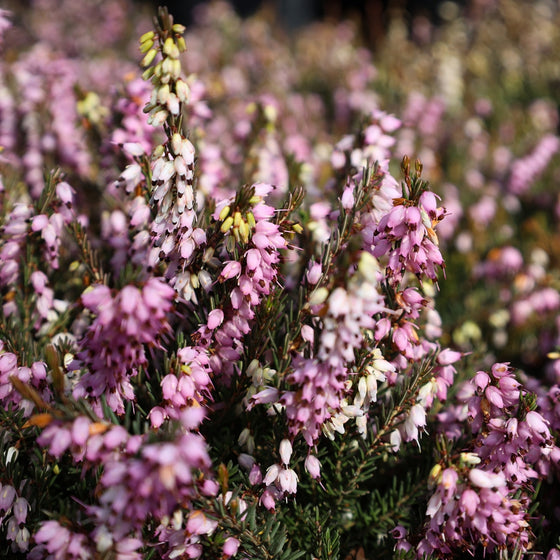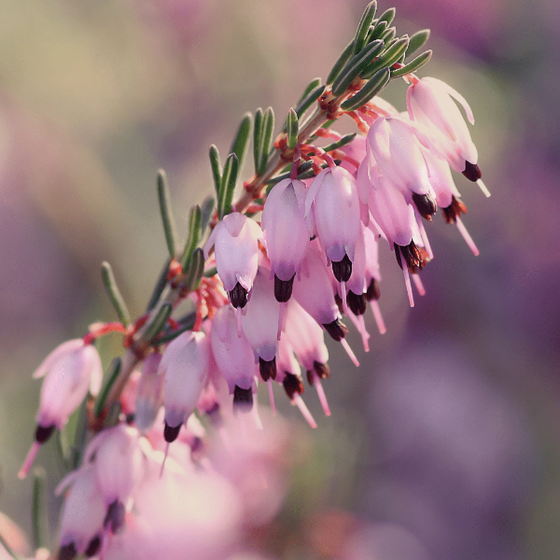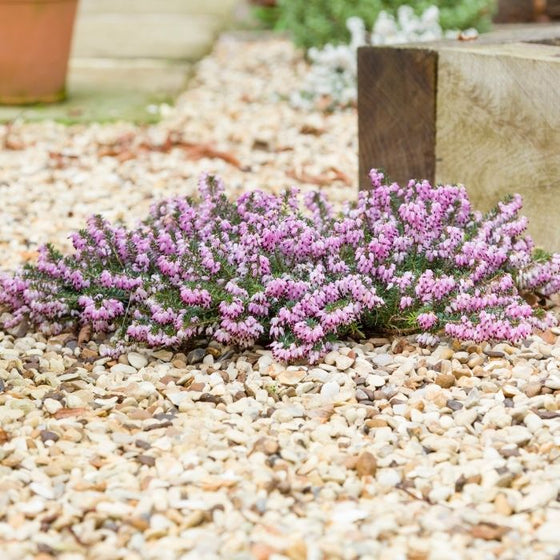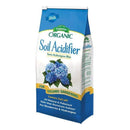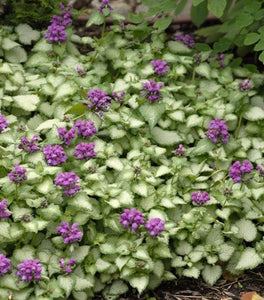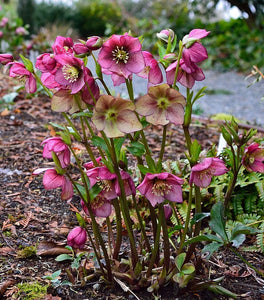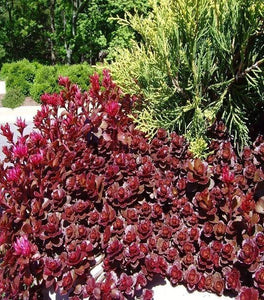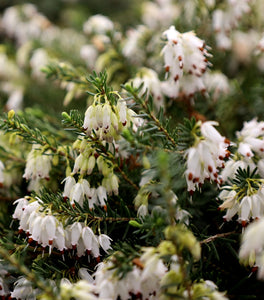
Images Depict Mature Plants
Mediterranean Pink Heather for Sale Online
Mediterranean Pink Heather (Erica x darleyensis ‘Mediterranean Pink’) is a charming, low-growing evergreen shrub prized for its profusion of bell-shaped, rosy-pink flowers that bloom from late winter into early spring. This early bloomer brings a splash of vibrant color to the landscape when little else is flowering, making it a standout addition to rock gardens, borders, and foundation plantings. With fine, needle-like foliage that remains green year-round, Mediterranean Pink Heather provides long-lasting texture and color in all seasons.
Ideal for full sun to partial shade, Mediterranean Pink Heather thrives in well-drained, acidic soil and is drought-tolerant once established. It grows in a tidy, mounding habit—typically reaching 12 to 18 inches in height and spreading up to 2 feet wide—making it an excellent groundcover option. This hardy, deer-resistant shrub is perfect for coastal gardens, slopes, and low-maintenance landscapes, where it adds beauty without demanding constant care. Its dense, spreading nature also helps with erosion control on banks and hillsides.
Hardy in USDA Zones 6–8, Mediterranean Pink Heather is both versatile and resilient. It pairs beautifully with other acid-loving plants like azaleas, rhododendrons, and dwarf conifers. Whether you're planting en masse for a stunning carpet of blooms or using it as a subtle accent in mixed beds, this heather variety brings soft color, evergreen structure, and reliable performance to gardens throughout the cooler months.
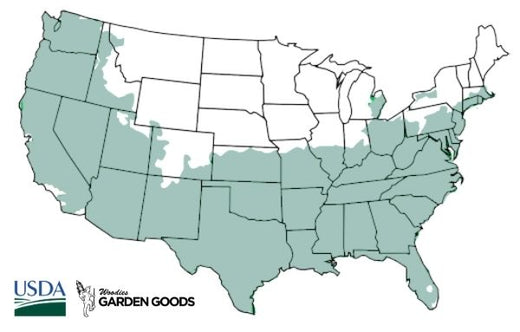
| Hardiness Zone: | 6-8 |
|---|---|
| Mature Height: | 1 to 2 feet |
| Mature Width: | 2 to 3 feet |
| Classification: | Fine Leaved evergreen shrub, Late Winter Flowering |
| Sunlight: | Full Sun to Part Shade |
| Habit: | Evergreen, mounding |
| Flower Color: | Lavender-Pink |
| Foliage: | Dark green |
| Soil Condition: | Any well drained soil |
| Water Requirements: | Water well until established |
| Uses: | Extremely attractive when used as a groundcover in the mixed border, mass planting, or a specimen planting. Provides unmatched late winter interest due to its flowering in the early winter |
How to Care for Mediterranean Pink Heather
Be sure to read our planting instructions to ensure a healthy and happy Mediterranean Pink Heather plant for years to come!
How to plant Mediterranean Pink Heather?
Planting Mediterranean Pink Heather begins with choosing the right location—this evergreen shrub thrives in full sun to partial shade and prefers well-drained, acidic soil. Start by loosening the soil to improve drainage, especially if you’re working with clay or compacted ground. Dig a hole twice as wide and just as deep as the plant’s root ball. Gently remove the heather from its container, tease out the roots if they are pot-bound, and place it in the hole so the top of the root ball sits level with the soil surface. Backfill with a mix of native soil and compost, and water thoroughly to help settle the soil. For a mass planting or groundcover effect, space Mediterranean Pink Heather shrubs about 18 to 24 inches apart. Mulch around the base with pine bark or shredded leaves to help retain moisture, suppress weeds, and maintain soil acidity—just be sure to keep mulch away from the crown of the plant to prevent rot. Avoid planting in areas with heavy, poorly draining soil, as this can lead to root rot. With the right site and planting method, Mediterranean Pink Heather will thrive, offering delicate winter blooms, evergreen texture, and low-maintenance beauty in rock gardens, borders, and slopes.
Watering Mediterranean Pink Winter Heather?
Watering Mediterranean Pink Heather correctly is key to establishing strong roots and promoting long-lasting blooms. During the first growing season, water regularly to keep the soil consistently moist but not soggy, especially in dry or windy conditions. A deep watering once or twice a week is typically sufficient, allowing moisture to reach the root zone without causing waterlogging. This heather prefers well-drained, acidic soil, so be cautious not to let it sit in standing water, which can lead to root rot. Once established, Mediterranean Pink Heather becomes moderately drought-tolerant, especially in cooler climates. However, it's important to monitor soil moisture during prolonged dry spells or periods of intense heat, as extended drought can reduce flowering and stress the plant. Applying a 2–3 inch layer of organic mulch, such as pine bark or leaf mold, can help retain moisture and maintain the acidic conditions this heather prefers. With proper watering habits, your Mediterranean Pink Heather will provide vibrant winter blooms and evergreen texture with minimal effort.
How to fertilize Mediterranean Pink Heather?
Fertilizing Mediterranean Pink Heather helps support lush foliage and vibrant late-winter blooms, but it should be done sparingly. In early spring, after the flowering period, apply a slow-release, acid-loving plant fertilizer—such as one formulated for azaleas or rhododendrons—to promote healthy growth and continued flowering. Spread the fertilizer evenly around the base of the plant, keeping it several inches away from the stems to prevent burn, and water thoroughly to help nutrients absorb into the soil. Avoid high-nitrogen fertilizers, which can encourage excessive leafy growth at the expense of flowers. For a more organic option, incorporate well-rotted compost or a light top-dressing of pine bark mulch, which also helps maintain the soil’s preferred acidic pH. Mediterranean Pink Heather generally doesn’t require heavy feeding and thrives in low-nutrient, well-drained conditions. With minimal yet timely fertilization, this evergreen shrub will reward you with reliable year-round foliage and beautiful pink blooms that brighten winter borders, rock gardens, and slopes.

How and when should I prune Mediterranean Pink Heather?
Pruning Mediterranean Pink Heather is essential for maintaining its compact shape, encouraging bushier growth, and promoting heavier blooming in the next season. The best time to prune is immediately after the flowering period in late winter or early spring. Use clean, sharp pruning shears to lightly trim back the spent flower spikes and any leggy or unruly growth. Avoid cutting into the woody stems below the green foliage, as heather does not readily regenerate from old wood. Regular light pruning each year after flowering helps the plant maintain a dense, rounded form and prevents it from becoming woody or sparse at the base. This low-maintenance care routine also stimulates the growth of new flowering shoots for the following season. Mediterranean Pink Heather’s natural mounding habit and evergreen texture make it a beautiful choice for borders, rock gardens, and slopes—and with consistent post-bloom pruning, it will stay lush, full, and colorful year after year.

